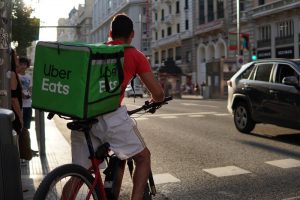Uber Technologies, DoorDash, and other app-based food delivery companies have filed lawsuits against New York City to overturn its unique minimum wage ordinance for delivery employees. The contentious law, requiring a minimum wage of $17.96 per hour, is facing backlash from the companies, who argue that it misunderstands the dynamics of the food delivery sector.
In a significant legal challenge to New York City's pioneering minimum wage law for app-based food delivery workers, Uber Technologies, DoorDash, and other industry giants have filed separate complaints in state court. The law, which went into effect on July 12, mandates a minimum hourly wage of $17.96, set to increase to nearly $20 by April 2025.
The crux of the companies' argument is that the city's minimum wage ordinance fails to account for the unique characteristics and economic realities of the food delivery sector. According to the complaints, the delivery apps would be compelled to increase trip completion rates per hour to offset the additional personnel expenses, leading to reduced service areas. This, they claim, would ultimately harm consumers and restaurants alike.
Relay Delivery, a New York-based company, also filed a lawsuit, echoing the concerns raised by Uber and DoorDash. The lawsuit contends that unless the law is amended to allow for higher restaurant costs, Relay Delivery may be forced out of business.
On the other side of the debate, the city's Department of Consumer and Worker Protection chief, Vera Mayuga, stands firm in her support for the minimum wage law. Mayuga argues that the measure is essential to helping thousands of delivery workers escape poverty. Currently, delivery workers in the city earn an average of only $11 per hour after deducting expenses, well below the $15 minimum wage.
The dispute further revolves around the classification of app-based delivery workers as independent contractors, who are not currently covered by minimum wage legislation. The companies assert that the law's enforcement on independent contractors would create additional challenges and hinder the flexibility that these workers value.
In their lawsuits, the corporations challenge the city's methodology, claiming that the delivery worker polls used to justify the law were biased and designed to support a predetermined minimum pay rate. They also argue that the law's premise, suggesting that restaurants earn minimal profits from app-based orders, lacks substantiation and places unnecessary and burdensome documentation requirements on businesses.
Uber, DoorDash, Grubhub, and others assert that the city's implementation of the minimum wage law violates state regulations against "arbitrary and capricious" restrictions. They are seeking a preliminary injunction to prevent the law from taking effect while the litigation progresses and, ultimately, for the law to be permanently struck down.
As the lawsuits unfold, the outcome will have far-reaching implications for both the rights of delivery workers and the operational dynamics of the app-based food delivery sector.






















